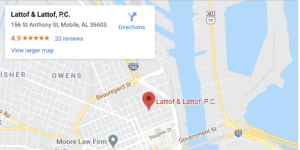What Are the Steps to Filing a Personal Injury Lawsuit?

You probably never expected to find yourself in this situation: injured and preparing to file a lawsuit against someone. While a traumatic car accident or assault can leave you feeling overwhelmed and uncertain of what to expect, the legal process ahead of you can be equally confusing.
You may be left unsure about how to navigate the legal process ahead or even know where to start.
At Lattof & Lattof, P.C., our Mobile personal injury lawyers are here to guide you through the process. We will help you fight for the fair compensation you deserve and prepare you for every step of the legal process from beginning to end.
The following is what you can expect during a personal injury lawsuit.
Table of Contents
Initial Consultation with a Personal Injury Lawyer

Unless your personal injury claim is very minor, it’s usually recommended that you discuss your claim with a personal injury law firm in Mobile. During this free consultation, you can discuss the details of your case and the injury lawyer will ask questions to better understand your case.
You can also ask questions including discussing the lawyer’s experience.
During the consultation, the lawyer may advise you on the best course of action and what types of compensation you may be entitled to receive. He or she will also discuss their attorney’s fees. At Latoff & Lattof, P.C., we work on a contingency fee basis. This means you pay nothing unless we secure compensation for you.
Investigation of Your Case
If you choose to retain a personal injury lawyer, the first step before filing a personal injury lawsuit is conducting an investigation of your case.
Your Mobile personal injury lawyer will perform an independent investigation of your case to assess:
- The scene of the accident
- Photographs
- Medical records
- Police reports
- Witness statements
- Your employment history and earning power
- Vehicle data from the black box
- Video surveillance
This process may take time, but it is crucial to building a strong case. Your lawyer will work to gather as much evidence as possible showing how your injuries occurred and why the other party should be held liable.
Prior to filing a lawsuit, your lawyer may also make a demand for settlement. This includes an outline of your case with the damages and injuries you have sustained. The other party can review this demand and reject it, accept it, or make a counteroffer.
If the demand for settlement is accepted, your case does not need to go to court. Sometimes your claim may be settled without filing a personal injury lawsuit.
Filing the Complaint
A personal injury lawsuit in Alabama begins when you, a plaintiff, file a complaint against someone else, the defendant, in court. A complaint seeks compensation for an injury you have sustained that was allegedly caused by the defendant. When the complaint is filed, the lawsuit has effectively started.
The complaint usually contains the identities of all parties involved, legal claims, facts related to the claims, and the legal basis for why the court has jurisdiction. In the complaint, you can explain what you want the court to do and either include an amount of the judgment you are seeking or ask the court to award an amount determined at trial.
Once the complaint is filed, the defendant must be aware they are being sued. This is done through a summons. The summons and complaint must be served to the defendant through a specific process.
After both the summons and complaint are filed and served, the defendant has the opportunity to respond. In Alabama, a defendant has 30 days to respond with an “answer.” In this answer, the defendant can admit or deny the allegations in the complaint and may even make a counterclaim.
The Discovery Process
Only when all of these initial pleadings have been filed does the discovery process begin. This is when the parties obtain evidence from the other to give all parties access to information relevant to the case. To exchange this evidence, each party must specifically request the information they want.
The discovery process can involve:
- Physical examination of a party whose condition is an issue in the case.
- Depositions in which one party’s attorney asks the other party questions under oath.
- Requests for admission. This happens when one party asks the other to deny or admit any facts in the case.
- Requests for production. One party may ask the other to provide copies of relevant documents.
- Interrogatories or specific questions one party submits that the other must answer under oath.
During the discovery phase, your personal injury lawyer in Mobile may consult with medical experts and accident reconstruction experts. These experts will provide insight into the case and reports that can be submitted. They may also testify on your behalf later.
Pretrial Hearings and Motions
Pretrial motions and hearings can be used by lawyers to compel the other party to submit evidence. In a personal injury lawsuit, they are often done with a goal of resolving the injury case before it goes to trial. Your attorney may file for a motion for summary judgment, for example, to argue the facts are undisputed and you should be granted immediate relief. The defendant’s attorney may file a motion to dismiss your case based on lack of evidence.
Negotiating a Settlement
There are three ways your case may be resolved without going to trial:
- Settlement. After the discovery phase, your Mobile injury lawyer will discuss a settlement with the defendant and their lawyer. There may be written offers and counteroffers or simply conversations.
- Mediation. When lawyers can’t resolve the case together, a mediator, or neutral third party, may help. The mediator cannot force the parties to reach an agreement, but they will discuss the strengths and weaknesses of each case.
- Arbitration. This adversarial proceeding occurs when a neutral third party is chosen to resolve the dispute. Arbitration works much like a trial with evidence presented and each side arguing their case. The arbitrator will decide the winning party. When parties agree to binding arbitration, they can’t appeal the ruling in court.
Your personal injury lawyer will discuss with you what your case may be worth if it goes before a jury and whether they think you stand a good chance of a jury award. However, trials are very expensive, time-consuming, and stressful. Your lawyer will seek to resolve your case through a settlement to recover the maximum compensation in the shortest amount of time.
Civil Trial
If your case is not resolved after the discovery phase, it will proceed to a civil trial. During the trial, a jury or judge considers the evidence presented by both sides and decides whether the defendant should be held responsible for the damages you have sustained.
A civil trial occurs in several phases:
- A jury is chosen
- Each side presents an opening statement
- Witnesses testify and each side can cross-examine
- Each side presents closing arguments
- The jury receives instruction
- The jury deliberates and returns with a verdict
The actual trial may last months but it will likely be anywhere from just one day to one week long.
The jury will not only decide if the defendant is legally liable but also the amount of damages in your case. Most personal injury cases settle before a trial begins. However, it’s important to choose an injury lawyer in Mobile with trial experience because your case may go before a jury. Lattof & Lattof, P.C. has more than a century of combined experience representing clients in court.
Collecting the Settlement or Judgment
Once a settlement is reached or the court enters a judgment against the defendant, your lawyer will work on collecting and distributing the funds. Sadly, defendants do not always follow a court order to pay the judgment amount. If this occurs, your lawyer will take extra steps which may incur more legal expenses. This may involve conducting a post-judgment discovery to uncover sources of income, garnishing the defendant’s wages, or placing a lien on their property.
Your personal injury lawyer will be paid from these funds which are also used to cover court costs and any hospital liens you may have.
Post-Trial Appeals and Motions
If your case went to trial and a judgment is entered, the defendant may file a post-trial motion asking that the judgment be set aside or reduced. An appeal can also be pursued to ask a higher court to determine if the trial involved legal mistakes. You can typically resume settlement negotiations if the case is on appeal.
Contact a Mobile Personal Injury Lawyer for a Free Case Review
Have you been seriously injured due to someone else’s negligence or recklessness? If you are considering filing a personal injury lawsuit, contact Lattof & Lattof, P.C. today to schedule a free consultation. We will help you explore your legal rights and begin building the strongest case possible for the compensation you deserve.

